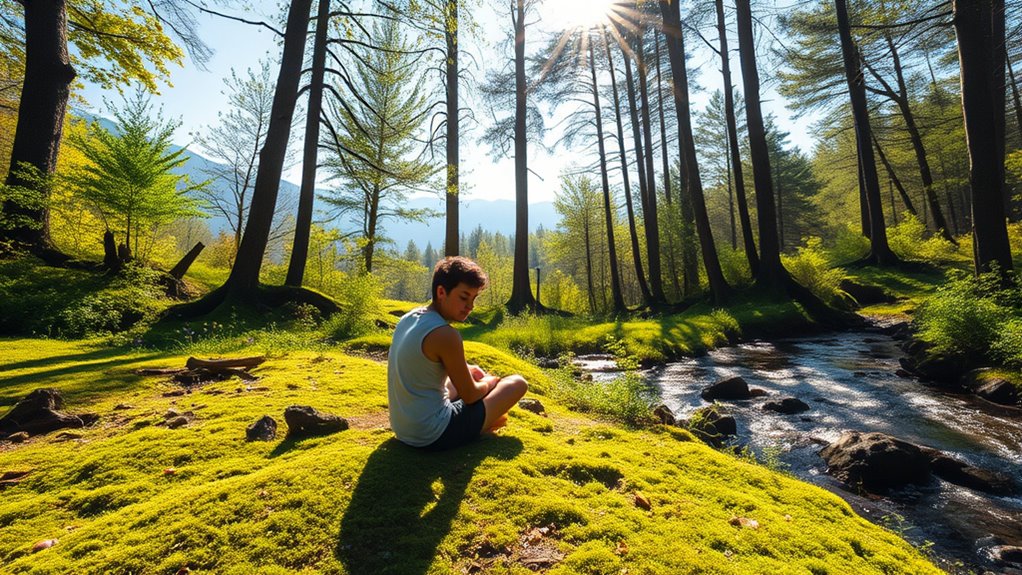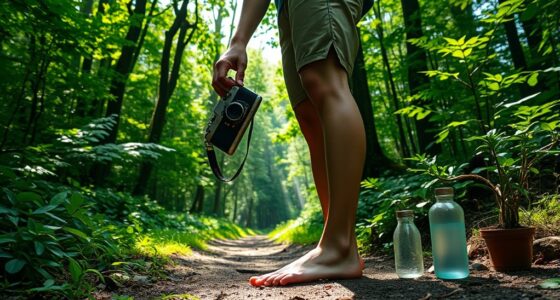Eco-therapy travel is backed by science that shows natural environments boost your mental and physical health. Spending time outdoors lowers stress hormones, improves mood, and enhances cognitive function through sensory engagement and neurochemical changes like increased serotonin. Connecting with nature also strengthens your bond with the environment, supporting long-term well-being. If you keep exploring, you’ll discover how innovative technologies and conservation efforts are shaping the future of eco-therapy experiences.
Key Takeaways
- Exposure to natural environments enhances mood, reduces stress hormones, and stimulates neurochemical responses like increased serotonin and dopamine.
- Interaction with urban wildlife and native plants fosters connectedness, emotional health, and cognitive clarity through sensory engagement.
- Immersion in green spaces boosts immune function, lowers cortisol levels, and promotes physical activity, supporting overall health and resilience.
- Eco-therapy leverages biophilia, encouraging direct human-nature interactions to strengthen mental resilience and emotional well-being.
- Technological innovations, such as virtual reality and biofeedback, are advancing personalized eco-therapy experiences and accessibility.
The Psychological Benefits of Natural Environments

Spending time in natural environments can profoundly boost your mental well-being. When you immerse yourself in settings where urban wildlife thrives, you experience a unique connection to the environment. Observing birds, insects, or small mammals sparks curiosity and fosters a sense of harmony with nature. These encounters enhance environmental aesthetics, making spaces feel more vibrant and alive. Such environments provide a mental escape from daily stress, helping you feel more relaxed and centered. The visual appeal of natural surroundings, combined with the presence of urban wildlife, can elevate your mood and improve focus. Engaging with these natural elements and practicing Leave No Trace principles helps sustain the environment and enriches your outdoor experience. By engaging with these natural elements, you tap into psychological benefits that support emotional resilience and overall mental health.
How Green Spaces Reduce Stress and Anxiety

Green spaces have a powerful effect on reducing stress and anxiety by providing a calming environment that promotes relaxation. Spending time in nature helps lower cortisol levels and calms your nervous system. These natural areas also support urban resilience by creating accessible havens that buffer city stressors. When you connect with green spaces, you’re not only easing your mental health but also contributing to biodiversity conservation, which sustains local ecosystems. The presence of diverse plant and animal life enhances the restorative quality of these environments, making them more effective at alleviating anxiety. Additionally, advancements in AI technology are increasingly being used to design and maintain green spaces that maximize their mental health benefits. As a result, green spaces serve as crucial refuges for mental well-being, helping you recharge and regain focus while strengthening the resilience of urban communities.
The Role of Nature in Enhancing Mood and Cognitive Function

When you immerse yourself in natural environments, your mood and cognitive abilities often improve considerably. Exposure to urban wildlife, for example, can boost feelings of connectedness and reduce stress. Botanical therapies, like engaging with native plants, enhance mental clarity and relaxation. Here are four ways nature supports your brain:
Immersing in nature boosts mood, reduces stress, and sharpens mental clarity through sensory engagement and mindfulness.
- Stimulates sensory engagement with sights, sounds, and smells.
- Reduces mental fatigue by providing calming natural stimuli.
- Encourages mindfulness through close interaction with flora and fauna.
- Enhances focus and memory by restoring attention span.
Additionally, understanding the supernatural realm can deepen your appreciation for the mysteries that surround natural phenomena, enriching your overall experience.
Physiological Effects of Spending Time Outdoors

Spending time outdoors can directly impact your body’s physiology in positive ways. You may notice your cortisol levels drop, your immune system strengthen, and your heart rate stabilize. These changes contribute to improved overall health and well-being.
Reduced Cortisol Levels
Research shows that spending time outdoors can substantially lower cortisol levels, the hormone associated with stress. When you’re immersed in nature, your body responds by reducing stress hormones, enhancing relaxation. This effect is linked to interactions with the soil microbiome, which releases beneficial compounds that support mental health. Additionally, outdoor activities promote carbon sequestration, helping regulate the environment and improve air quality. Incorporating fraud detection techniques in outdoor-related activities can further ensure safe and secure experiences. Here are four ways outdoor exposure helps lower cortisol:
- Soil microbiome contact boosts mood through beneficial microbes.
- Natural sounds reduce stress by calming your nervous system.
- Sunlight exposure increases vitamin D, which stabilizes cortisol levels.
- Physical activity in nature stimulates endorphin release, counteracting stress.
Enhanced Immune Function
Regular outdoor exposure strengthens your immune system by increasing the production of natural killer cells and antibodies. When you spend time outside, you’re exposed to diverse soil microbiota, which helps train and boost your immune defenses. These beneficial microbes enhance your body’s ability to recognize and fight off pathogens. Additionally, being outdoors can reduce pollen allergies over time by helping your immune system become more tolerant to environmental allergens. The diversity of microbes in natural settings supports a balanced immune response, preventing it from overreacting to harmless substances like pollen. As a result, outdoor activity not only improves your overall immunity but may also lessen allergy symptoms, making you better equipped to handle seasonal changes and environmental challenges. Incorporating soil microbiota into your routine can further support immune health by promoting beneficial microbial diversity.
Lower Heart Rate
Immersing yourself in natural environments can have a calming effect on your cardiovascular system, often leading to a lower resting heart rate. Spending time outdoors reduces stress and promotes relaxation, which benefits your heart health. This calming effect is linked to how nature influences your nervous system and can enhance your connection with plant communication, fostering a sense of harmony. Additionally, eco-friendly architecture creates spaces that support this calming environment, encouraging your body to relax further. Research shows that the physiological effects of outdoor exposure can significantly improve your overall well-being. Here are four ways outdoor environments lower your heart rate:
- Decrease in stress hormones
- Improved breathing from cleaner air
- Enhanced mental clarity and focus
- Connection with nature’s calming rhythms
The Science of Biophilia and Human-Nature Connection

Have you ever wondered why spending time in nature feels so restorative? It’s because of biophilia—a natural human affinity for the environment. Our brains are wired to seek connection with nature, which boosts mental well-being. When you engage your senses—touching leaves, hearing birds, smelling flowers—you strengthen this bond. This sensory engagement enhances your emotional health and reduces stress. Scientific studies show that environments rich in biodiversity preservation promote deeper human-nature connections, amplifying these benefits. Your brain responds positively to natural stimuli, releasing feel-good chemicals like serotonin. By fostering this innate connection, eco-therapy travel helps you recharge mentally and emotionally, reaffirming the importance of preserving natural spaces for your health and the planet’s future. Additionally, biodiversity plays a crucial role in strengthening these beneficial interactions.
Outdoor Activities and Their Impact on Mental Health

Engaging in outdoor activities like hiking, kayaking, or gardening can considerably boost your mental health by reducing stress and improving mood. When you immerse yourself in nature, you connect with urban wildlife and experience the calming effects of natural surroundings. Plus, outdoor pursuits can teach valuable skills, such as:
Outdoor activities boost mental health, connect us with urban wildlife, and foster resilience and mindfulness.
- Recognizing local urban wildlife and understanding their role in ecosystems
- Developing wilderness survival skills that foster confidence and resilience
- Enhancing mindfulness through direct engagement with nature’s sights and sounds
- Building a sense of accomplishment from overcoming outdoor challenges
- Learning about juice cleansing and its effects on health to appreciate the benefits of natural nutrition.
These activities not only boost your mental well-being but also deepen your appreciation for nature’s complexity, inspiring greater conservation efforts and personal growth.
Neurochemical Changes Induced by Eco-Therapy

Spending time in natural environments triggers a cascade of neurochemical responses that can profoundly enhance your mental well-being. Eco-therapy promotes neurotransmitter modulation, increasing levels of serotonin and dopamine, which lift your mood and reduce stress. These changes help balance your brain chemistry, fostering a sense of calm and happiness. Additionally, eco-therapy encourages neuroplasticity enhancement, strengthening neural connections and promoting adaptive brain function. This process improves your ability to manage emotions and react positively to future stressors. As you immerse yourself in nature, your brain responds by releasing these beneficial neurochemicals, supporting mental resilience and emotional stability. The neurochemical shifts driven by eco-therapy underline how nature exposure can directly influence your brain’s chemistry, fostering long-term mental health benefits. Incorporating sound recording techniques and creating calming soundscapes can further enhance the therapeutic effects of eco-therapy.
The Long-Term Health Benefits of Regular Nature Exposure

Regularly immersing yourself in nature can lead to significant long-term health benefits that extend beyond immediate mood boosts. Spending time in urban parks and natural areas can:
- Improve cardiovascular health through increased physical activity
- Reduce stress levels, lowering risks of chronic illnesses
- Boost immune function by fostering wildlife conservation awareness
- Enhance cognitive function and focus over time
Consistent exposure to green spaces helps you develop healthier habits and stronger connections to nature. These benefits support overall well-being, resilience, and a sense of community. Incorporating regular visits to urban parks not only benefits your health but also contributes to wildlife conservation efforts, ensuring these natural spaces remain vibrant and accessible for future generations.
Future Directions in Eco-Therapy Research

As research continues to uncover the long-term health benefits of connecting with nature, attention shifts toward exploring how eco therapy can be optimized and expanded. Future studies will likely focus on integrating eco therapy technology to personalize experiences and track progress more effectively. Additionally, increasing urban biodiversity plays a pivotal role, offering accessible green spaces that support mental health and well-being. Researchers may explore innovative ways to incorporate technology into eco-therapy sessions, such as virtual reality or biofeedback tools, to enhance engagement and measurable outcomes. Expanding understanding of how urban ecosystems impact therapy outcomes could lead to more targeted interventions. Moreover, leveraging solar energy solutions in urban settings can make eco-therapy practices more sustainable and accessible. Ultimately, combining eco therapy technology with efforts to boost urban biodiversity may revolutionize eco-therapy, making it more effective, scalable, and accessible for diverse populations.
Frequently Asked Questions
How Does Eco-Therapy Influence Neuroplasticity and Brain Structure?
Eco-therapy influences neuroplasticity mechanisms by promoting environments that reduce stress and enhance emotional regulation. When you engage with nature, your brain undergoes remodeling, strengthening neural connections related to calmness and focus. This process encourages brain plasticity, allowing your brain to adapt and reorganize. As a result, eco-therapy supports long-term mental health improvements by facilitating positive brain changes and fostering resilience through continuous brain remodeling.
Are There Specific Environmental Factors That Maximize Therapeutic Benefits?
Think of the environment as a garden for your mind. To maximize therapeutic benefits, seek biodiverse settings that nurture your senses and promote resilience. Rich biodiversity offers diverse stimuli, boosting your healing potential. Additionally, choosing eco-friendly locations minimizes climate impact, preserving these natural spaces for future healing. By immersing yourself in vibrant, sustainable environments, you deepen your connection to nature, revealing greater mental clarity and emotional balance.
Can Eco-Therapy Be Tailored for Individuals With Severe Mental Health Issues?
You can absolutely tailor eco-therapy for individuals with severe mental health issues by using personalized approaches that focus on trauma integration. Your therapist can adapt nature-based activities to meet your specific needs, helping you process trauma safely. This individualized method guarantees you get the most therapeutic benefit, fostering healing and resilience. Eco-therapy’s flexibility makes it a powerful tool for those with complex mental health challenges.
What Are the Potential Risks or Downsides of Eco-Therapy Travel?
Did you know that 60% of eco-therapy travelers report feeling overwhelmed by climate change impacts? Risks include exposure to harsh environments, which can worsen health issues if not managed carefully. Cultural sensitivity is vital; missteps may offend local communities or damage ecosystems. While eco-therapy offers benefits, you should weigh potential downsides like environmental impact, emotional distress, and cultural misunderstandings to guarantee a safe, respectful experience.
How Does Eco-Therapy Compare to Traditional Mental Health Treatments?
You might find eco-therapy offers a unique approach compared to traditional treatments by emphasizing nature connection and outdoor activities to boost mental health. While conventional therapy often involves talk-based methods, eco-therapy engages you physically and emotionally with the environment, fostering mindfulness and stress relief. This holistic approach can complement standard treatments, but it’s crucial to take into account individual needs and consult professionals to determine the best mental health strategy for you.
Conclusion
As you step into nature’s embrace, you open a wellspring of peace and vitality, like a seed blooming into resilience. Each moment outdoors is a gentle brushstroke on the canvas of your well-being, nurturing your mind and body. Embrace eco-therapy as your path to harmony, where the forest’s whisper and sunlight’s warmth symbolize renewal. Let nature’s symbolism remind you that health and clarity grow strongest when rooted in the natural world.










